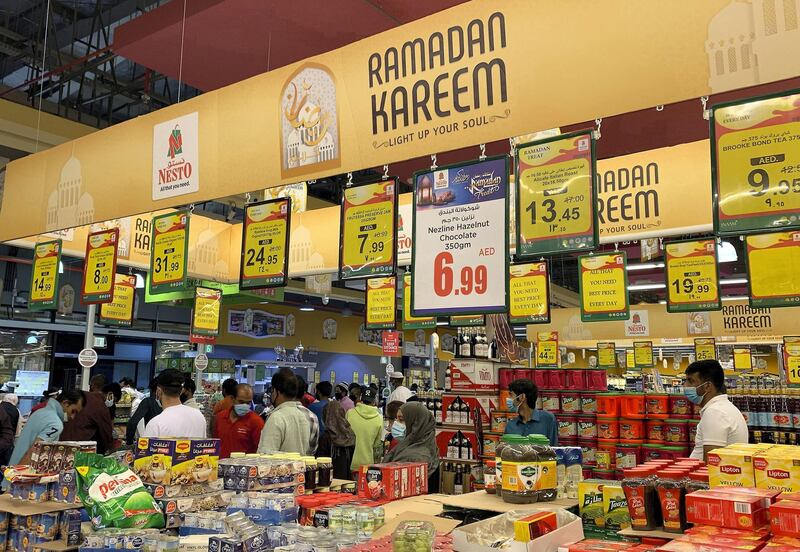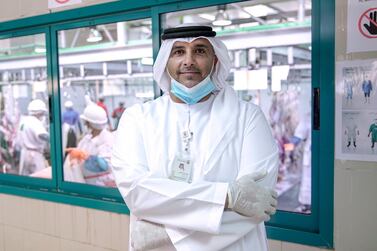Every year, shoppers fill their trolleys to the brim with everything from rice and meat to Vimto and frozen samosas to prepare for Ramadan.
But this year was a little different, with shoppers wearing face masks and gloves before waiting in queues, in some cases to have their temperature checked, before being allowed into supermarkets.
Despite the measures put in place to prevent the spread of Covid-19, shoppers said buying food was an important part of preparing for the holy month to begin.
“It would not be a proper Ramadan shop for me if my trolley lacked certain items that I only use throughout the holy month, like cheese and vegetable samosas and Vimto and Qamar Al Din,” said Deema Ali, 36, a Jordanian who lives in Ajman.
Her shopping trolley was full of her family of four’s favourites, as well as items such as chicken, rice and flour.
The aisles of Nesto Supermarket were busy on Thursday but not overcrowded, as a result of government measures that limited customer capacity to 30 per cent.
“It wasn’t hard to find everything I needed in the store. People can rest assured that everything is available, thank God,” she said.
For healthcare workers, stocking up on food has been the norm for the past few months.
“With the extended working hours, I don’t have the luxury of shopping whenever I want any more and I am more careful about how I do it,” said Egyptian medic Abboud Mohammed, 31.
“To protect my family and make sure they are safe, I never bring my daughter, who is still five months old, or my wife. I do the shopping alone.
“I don’t overstock my kitchen with food items. Everything is available so I buy what my family of three needs.”
Supermarkets prepared for the pre-Ramadan rush by stocking up on staples and introducing new services to keep people safe as they shop.
LuLu Hypermarkets launched drive-through shopping options at branches in Sharjah, with customers able to pick up items they bought online.
The chain also launched an express shopping and delivery service that it said would offer same-day drop offs for 200 essential items, including bread, milk, fresh fruit and meat, if the orders were placed before 4pm.
“Ramadan is a big time of year for supermarkets and deliveries,” a LuLu Hypermarket spokesman said.
“It is particularly challenging with the current restrictions in place.
“Our procurement team has been prepared for some time to ensure all our supermarkets are well stocked with the usual items people want at this time of year, in our warehouse and shops across the region.
"We have a focus on traditional Ramadan produce like Vimto, fresh fruit, dates and nuts – all the usual food that people want to break their fast.
“We are encouraging social distancing in all our stores, so we do not want people to rush into shops just before closing time at 8pm.”
Carrefour said it also prepared for the holy month by stocking up on essential items and offered its usual Ramadan discounts.
“While there is a tendency for people to buy additional goods, we encourage all our valued customers to shop responsibly based on their needs, as there is enough supply for everyone,” a Carrefour representative said.
This week, authorities urged people to avoid over-shopping for the holy month and police closed the road leading to Ajman's fruit and vegetable market at 6.30pm on Thursday due to a swelling crowd.
Tahani Mohammed, who is from Yemen, said she had always found it frustrating that people flocked to supermarkets and bought too much food during Ramadan.
She said that the effects of the coronavirus pandemic meant people should be more mindful of those who may struggle to buy food this year.
“Its serves a purpose that is the opposite of what we should be doing during Ramadan,” she said.
"I believe now we have two opportunities to show our compassion to those who need it – Ramadan and the crisis of coronavirus.
"Instead of overbuying, let's help those who cant buy.”







